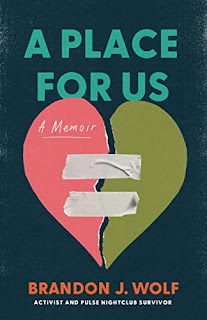Life in Lashes by Kita Mean
First released October 2022 via HarperCollins★★★
I should be reading Olivia Jones's Ungeschminkt—I've been making slow progress for well over a year—but you know what's easier than reading a drag-queen memoir in German? Reading a drag-queen memoir in English, that's what. Fortunately, Kita Mean is more than ready to step up and serve.
Kita Mean made an international name for herself with the first season of RuPaul's Drag Race Down Under, but in New Zealand she was already a force to be reckoned with—established in the New Zealand drag scene, running multiple drag and performance venues, and having hosted her own drag show with Anita Wigl'it. (I haven't seen House of Drag, but it sounds like a riot, and I loved learning that it embraced drag kings and AFAB as well as AMAB drag queens.) Life in Lashes slips easily from Kita Mean's early days in drag—which is to say, young Nick tromping around the backyard in his sister's dresses—to learning about the Auckland drag scene to becoming a celebrated performer in her own right to competing in Rupaul's Drag Race Down Under.
Drag queens are known for their wit as well as for their style, but don't underestimate Kita Mean's deft ability to "read" between the lines, too. Not a bad word to say about RuPaul—just a glowing note that never seeing RuPaul offset made her even more inaccessible and elevated. And there's a point early on where she describes her first encounter with a drag queen she calls Peena Colada in the book. It's Peena Colada who first sees Kita Mean—who notices her and puts the idea of performing into her head. I highlighted the section, because for a few pages at least it seemed like a wonderful illustration of how much of a difference feeling seen can make. But that relationship gets complicated, and not long thereafter Kita Mean describes meeting another queen—one determined to lift other performers up, not cut them down. Now...it's not that Kita Mean is subtle in her opinions about Peena Colada. But the back-to-back introductions of Peena Colada (sweet at first, but no substance) and Tess Tickle (slow to warm up, but then a fierce supporter) are so telling, and a valuable reminder to anyone who might find themselves in a position of influence over someone younger—who do you want to be? The person knocking over another person's ladder, or the person helping to get that ladder securely in place?
A content note: there's a fair amount of what reads like internalized fatphobia. Kita Mean notes herself that, growing up big, it was easier/safer to be the first one to make jokes about weight, but it's something to be aware of if it's something you'd rather not read. And then a different kind of content note: I've watched a fair amount of Drag Race, but I haven't seen the Down Under version, and if possible, I'd recommend watching it before reading. You'll still be able to visualize the Drag Race situations Kita Mean describes without that background, but for obvious reasons you'll be able to visualize it better if you've, well, seen it already. Barring that, look for a compilation video of all her Drag Race looks after you read the book, and at the very least you'll get a more visceral sense of her style and energy.
Thanks to the author and publisher for providing a free review copy through NetGalley.











